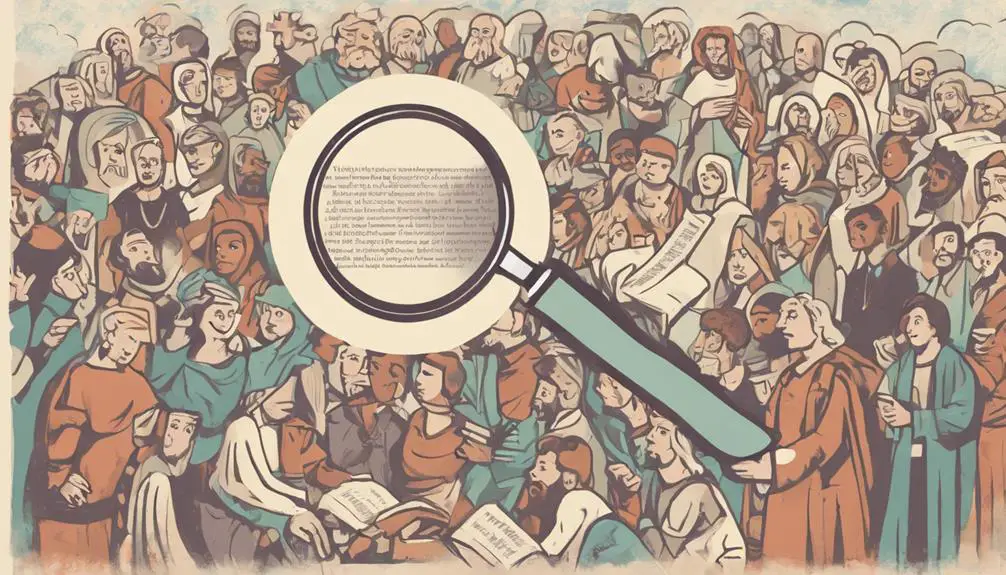Take a deep dive into 1 Thessalonians 4:13-18 with enlightening Bible study questions, unlocking new perspectives on Christ's second coming.

1 Thessalonians 4:13-18 Bible Study Questions
While you might feel apprehensive about engaging with Bible study questions, particularly those concerning passages like 1 Thessalonians 4:13-18, let's remember that it's through these inquiries we grow in our understanding.
You're on a quest to uncover the deeper meanings, historical context, and personal applications found within these verses. This exploration will offer new insights and perspectives on the Apostle Paul's teachings about Christ's second coming.
So, are you ready to engage with these thought-provoking questions, and perhaps, even find some unexpected answers?
Key Takeaways
- Apostle Paul wrote 1 Thessalonians around 50-51 AD to comfort and guide early Christians in Thessalonica facing severe persecution.
- Key verses (13-18) in the chapter address life, death, resurrection, and Christ's second coming.
- The theological insights from the passage highlight the assurance of resurrection and eternal life, promoting hope and comfort.
- Paul's teachings prompt reflections on personal faith, mortality, and the future, offering profound implications for spiritual understanding and practice.
Historical Context of 1 Thessalonians

To fully grasp the depth of 1 Thessalonians 4:13-18, it's crucial to first understand the historical context in which this epistle was written. Penned by Apostle Paul around 50-51 AD, this letter is generally considered one of his earliest writings, if not the first. The city of Thessalonica, where the new Christian community to whom Paul was writing resided, was a bustling urban center in ancient Macedonia, an integral part of the Roman Empire.
The Thessalonians were facing severe persecution for their faith, causing them considerable distress and confusion. It's within this context that Paul's words in 1 Thessalonians 4:13-18 become particularly poignant. The believers were grappling with questions about life, death, and the return of Jesus Christ. They were worried about the fate of their deceased loved ones, wondering if they'd miss out on the promised return of Christ. This concern wasn't abstract theology for them; it was an immediate, pressing issue.
Understanding Key Verses

Delving into the key verses of 1 Thessalonians 4:13-18, you'll find powerful messages that were designed to comfort and guide the early Christians in their time of distress. These verses served as a beacon, providing hope and reassurance amidst uncertainty and fear.
In verse 13, Paul's intent is to enlighten the Thessalonians, ensuring they aren't uninformed about those who sleep in death. His use of the term 'sleep' is a common early Christian metaphor for death, softening the finality of the concept.
Verses 14-15 pivot towards the belief in Jesus' resurrection, offering solace by affirming that God will bring with Jesus those who've fallen asleep in him. Paul's rhetoric here is comfortingly assertive, reinforcing the certainty of resurrection and divine companionship.
Moving to verses 16-17, you'll observe the vivid description of the Lord's descent from heaven, the dead rising first, then the living being caught up together with them. This imagery is compelling, designed to evoke a sense of awe and anticipation.
Lastly, verse 18 wraps up with an exhortation to comfort one another with these words, highlighting the communal aspect of early Christianity where mutual support was critical. Through this close reading, you'll gain a deeper understanding of these key verses.
Theological Insights and Interpretations

Peeling back the layers of 1 Thessalonians 4:13-18, you'll uncover a wealth of theological insights and interpretations that can deepen your understanding of early Christian beliefs. This passage delivers a profound message about resurrection and the second coming of Christ.
Paul's letter to the Thessalonians offers a unique eschatological perspective. He reassures that those who've died won't miss Christ's triumphant return; instead, they'll be the first to rise. This serves as a comforting affirmation of life after death, a cornerstone of Christian faith.
Furthermore, Paul's description of the Lord's descent from heaven with a command, an archangel's voice, and God's trumpet is rich in apocalyptic symbolism. It signifies divine authority and the dramatic nature of Christ's return, underscoring the importance of being prepared for this monumental event.
Interpreting this passage, you'll find a compelling blend of hope, comfort, and admonition. The hope rests in the promise of eternal life, the comfort in the assurance of loved ones' resurrection, and the admonition in the call to vigilance and righteousness. It's a potent reminder that faith in Christ transcends death, leading to eternal communion with God. This narrative deeply contributes to the theological understanding of eschatology in Christianity.
Personal Reflections and Applications

Reflecting on these theological insights, you might consider how Paul's words directly apply to your own beliefs and spiritual journey. Paul's teachings in 1 Thessalonians 4:13-18 offer a profound perspective on life, death, and resurrection, which can profoundly shape your understanding and experience of faith.
You're encouraged to engage with these teachings on a personal level. Do they resonate with your current beliefs? Do they challenge you, comfort you, or provoke further questions? Are there aspects of your life or spiritual journey that these teachings illuminate?
Let's consider three key areas of reflection and application: understanding of death, hope in resurrection, and comfort in sorrow. The table below will guide your reflection:
Reflection Area |
Paul's Teaching |
Your Application |
|---|---|---|
Understanding of Death |
Death is not the end (1 Thes 4:13) |
How does this shape your view of mortality? |
Hope in Resurrection |
Believers will rise again (1 Thes 4:16) |
How does this influence your hope for the future? |
Comfort in Sorrow |
We don't grieve like those without hope (1 Thes 4:13) |
How can this teaching comfort you in times of loss? |
Your responses will illuminate how Paul's teachings can be personally applied and experienced in your spiritual journey.
Questions for Group Discussion

As you dive into this group discussion, consider the rich theological insights provided by Paul in 1 Thessalonians 4:13-18 and how they can foster a deeper understanding and application within your spiritual journey. The text is laden with profound messages about life, death, resurrection, and the second coming of Christ. It's essential to peel back these layers for a more nuanced appreciation of Paul's teachings.
Start by discussing what Paul's message about the resurrection means to you. How does it shape your perception of death and the afterlife? Ask others for their interpretation as well, as it can offer diverse perspectives and deepen the conversation.
Next, ponder over the concept of the 'rapture'. It's a controversial topic with varied interpretations. Discuss your understanding and how it aligns with Paul's depiction in the Thessalonians.
Lastly, reflect on the final verse, where Paul encourages reassurance through these teachings. Has this passage provided comfort or stirred unease? Share your thoughts and listen to others, allowing their insights to broaden your spiritual perspective.
Conclusion
You've delved deep into 1 Thessalonians 4:13-18, unpacking historical context, key verses, and theological insights.
You've reflected personally and posed critical questions for group discussions.
Now, it's essential to carry this understanding into your daily life, letting it shape your faith.
Remember, Bible study isn't just about knowledge; it's about transformation.
So, keep exploring, questioning, and applying these biblical truths to your own journey.



Sign up